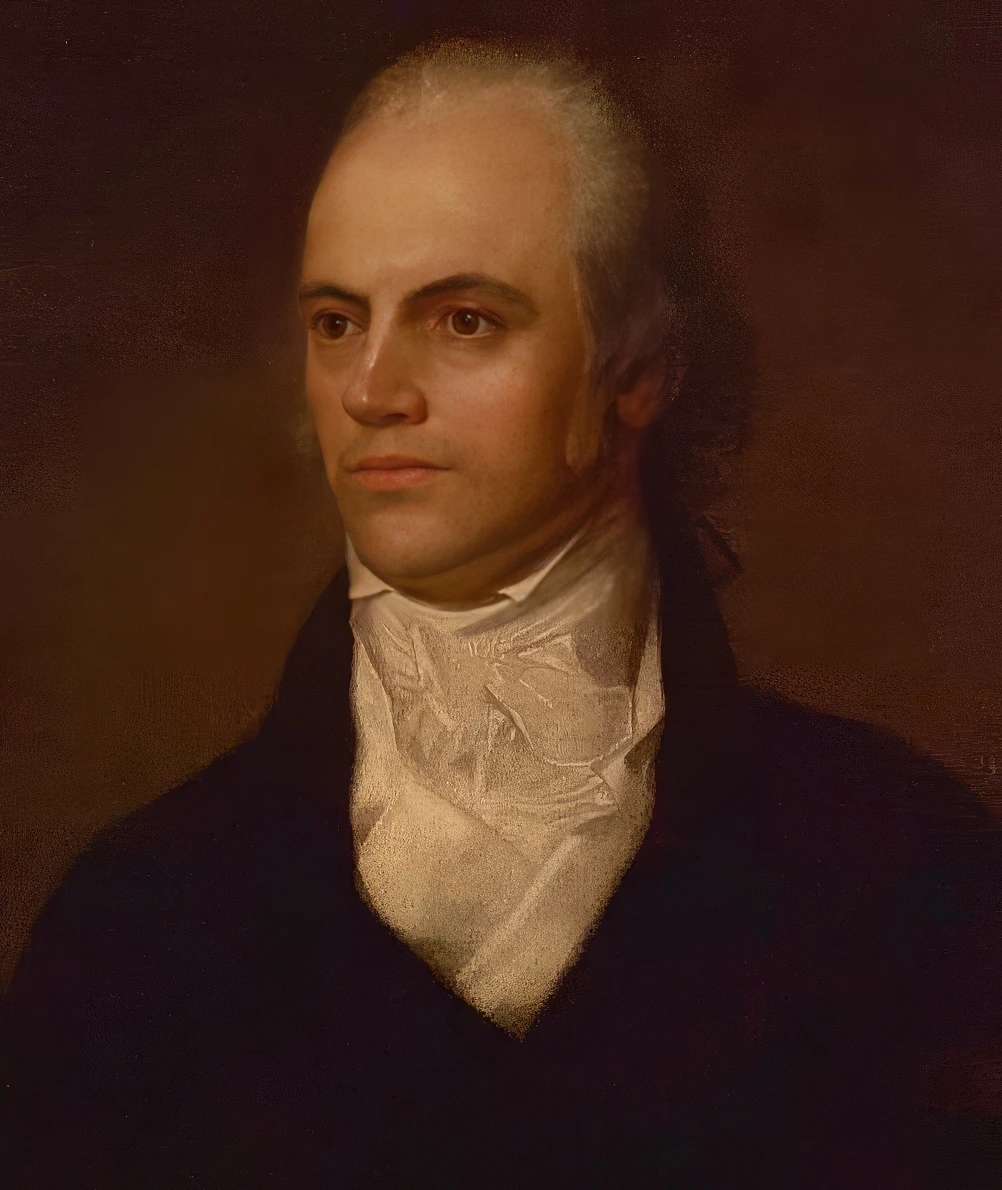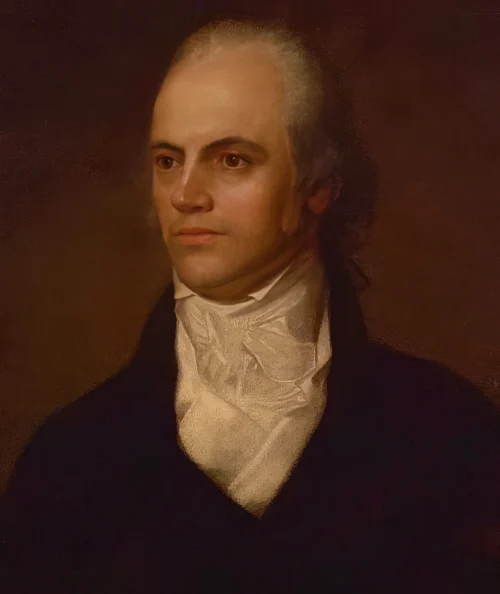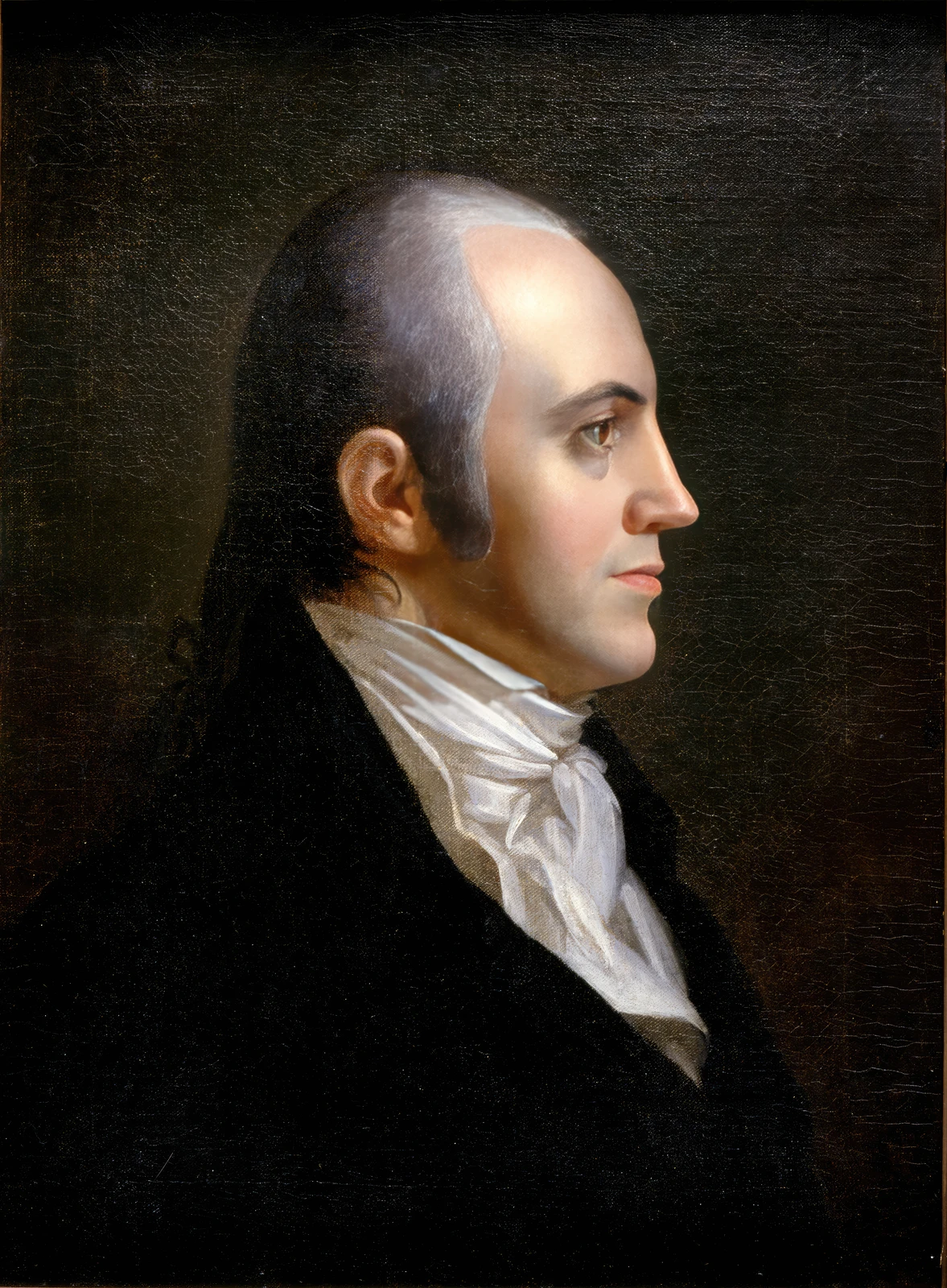Aaron Burr Jr.

Aaron Burr Jr. was an American politician, lawyer, and Founding Father who served as the third Vice President of the United States from 1801 to 1805, during Thomas Jefferson’s first presidential term. His career was marked by significant political maneuvering, a highly contested presidential election, and ultimately, his infamous duel with Alexander Hamilton, which ended Hamilton’s life and largely derailed Burr’s political career.
Listen to an introduction about Aaron Burr Jr.

Name: Aaron Burr Jr.
Date of birth: February 6, 1756
Died: September 14, 1836 (aged 80), in Port Richmond, New York, U.S. He suffered multiple strokes that left him partially paralyzed before his death.
Height: Information not consistently available, but generally estimated around 5 feet 6 inches.
Place of birth: Newark, Province of New Jersey (then one of the Thirteen Colonies of British America).
Family:
- Parents’ names: Aaron Burr Sr. (father, a prominent Presbyterian minister and second president of the College of New Jersey, now Princeton University) and Esther Edwards Burr (mother). His mother was the daughter of the renowned theologian Jonathan Edwards. Both of his parents died when he was very young, leaving him orphaned at age two.
- Siblings: Sarah (Sally) Burr (older sister).
- Spouse:
- Theodosia Bartow Prevost (m. 1782; died 1794). She was a widow ten years his senior.
- Eliza Jumel (m. 1833; div. 1836). She was a wealthy widow. Their divorce decree was granted on the day of his death.
- Children:
- Theodosia Burr Alston (daughter, born 1783, with Theodosia Prevost). She disappeared at sea in 1812.
- He also had two children by a woman of color, Mary Emmons: John Pierre Burr (1792–1864), who became a prominent abolitionist and conductor on the Underground Railroad, and Aaron Columbus Burr.
- Relatives: His grandfather was the celebrated theologian Jonathan Edwards.
Profession: Lawyer, politician, military officer, businessman.
Nationality: American
Religion: He was born into a prominent Presbyterian family, with his father and grandfather being famous ministers. While he studied theology briefly, he later pursued law, and his personal religious practices are not a dominant theme of his public life.
College or university attended:
- Elizabethtown Academy (early education)
- College of New Jersey (now Princeton University) (graduated in 1772 at age 16)
- He later studied law, including at Litchfield Law School.
Biography and What Famous For:
Aaron Burr’s early life was marked by the loss of his parents and grandparents by the age of four, leading him and his sister to be raised by an uncle. He was a precocious student, entering Princeton at 13 and graduating at 16. With the outbreak of the American Revolution, he joined the Continental Army, serving with distinction under Benedict Arnold during the Quebec expedition and later briefly on George Washington’s staff (though they reportedly developed a mutual dislike). He resigned due to ill health in 1779.
After the war, Burr established a successful law practice in New York City and quickly entered politics, becoming a leading figure in the emerging Jeffersonian Democratic-Republican Party.
Aaron Burr is most famous for:
- The Disputed Presidential Election of 1800: He ran as the Vice Presidential candidate alongside Thomas Jefferson. Due to the electoral system at the time (before the 12th Amendment), electors cast two votes for president, and the candidate with the most votes became president, and the second-highest became vice president. Jefferson and Burr tied with 73 electoral votes each. Burr controversially refused to concede, leading to a protracted deadlock in the House of Representatives. Only after 36 ballots did Jefferson prevail, with Burr becoming his Vice President. This episode created a deep animosity between Jefferson and Burr.
- Serving as the Third Vice President of the United States (1801–1805): During his vice presidency, he played a limited role in the administration due to Jefferson’s distrust but presided over the Senate with efficiency.
- The Burr–Hamilton Duel (1804): His long-standing political and personal rivalry with Alexander Hamilton (a prominent Federalist who viewed Burr as dangerous and publicly slandered him during Burr’s campaign for New York governor) culminated in a duel at Weehawken, New Jersey, on July 11, 1804. Burr fatally wounded Hamilton, who died the next day. This event, though Burr was acquitted of murder charges, effectively ended his legitimate political career and left him a polarizing figure.
- The Burr Conspiracy (1807): After his vice presidency, Burr embarked on a mysterious venture in the western United States, allegedly plotting to create an independent nation in the American Southwest or to invade Spanish territory. His actions led to his arrest and a highly publicized trial for treason, presided over by Chief Justice John Marshall. Though acquitted due to a narrow interpretation of treason in the Constitution, the trial further tarnished his reputation.
After the conspiracy trial, Burr lived in Europe for several years, attempting to gain foreign support for various schemes, before returning to New York in 1812 to resume his law practice. He died on the very day his second wife’s divorce decree was granted. His complex legacy often portrays him as a brilliant but ambitious and ultimately tragic figure in early American history.
Have participated:
Military Service:
- Continental Army (American Revolutionary War, 1775–1779)
- Participated in the Quebec Expedition (1775)
Legal Career:
- Admitted to the New York state bar (1782)
- Practiced law in New York City (1783–1789, 1812–1836)
Political Offices:
- New York State Assemblyman (1784–1785, 1798–1799)
- Attorney General of New York (1789–1791)
- U.S. Senator from New York (1791–1797)
- Third Vice President of the United States (1801–1805)
Major Historical Events/Controversies:
- Disputed Presidential Election of 1800
- Burr–Hamilton Duel (1804)
- The Burr Conspiracy and treason trial (1807)
- Founder of the Manhattan Company (1799), which became a major bank.






















